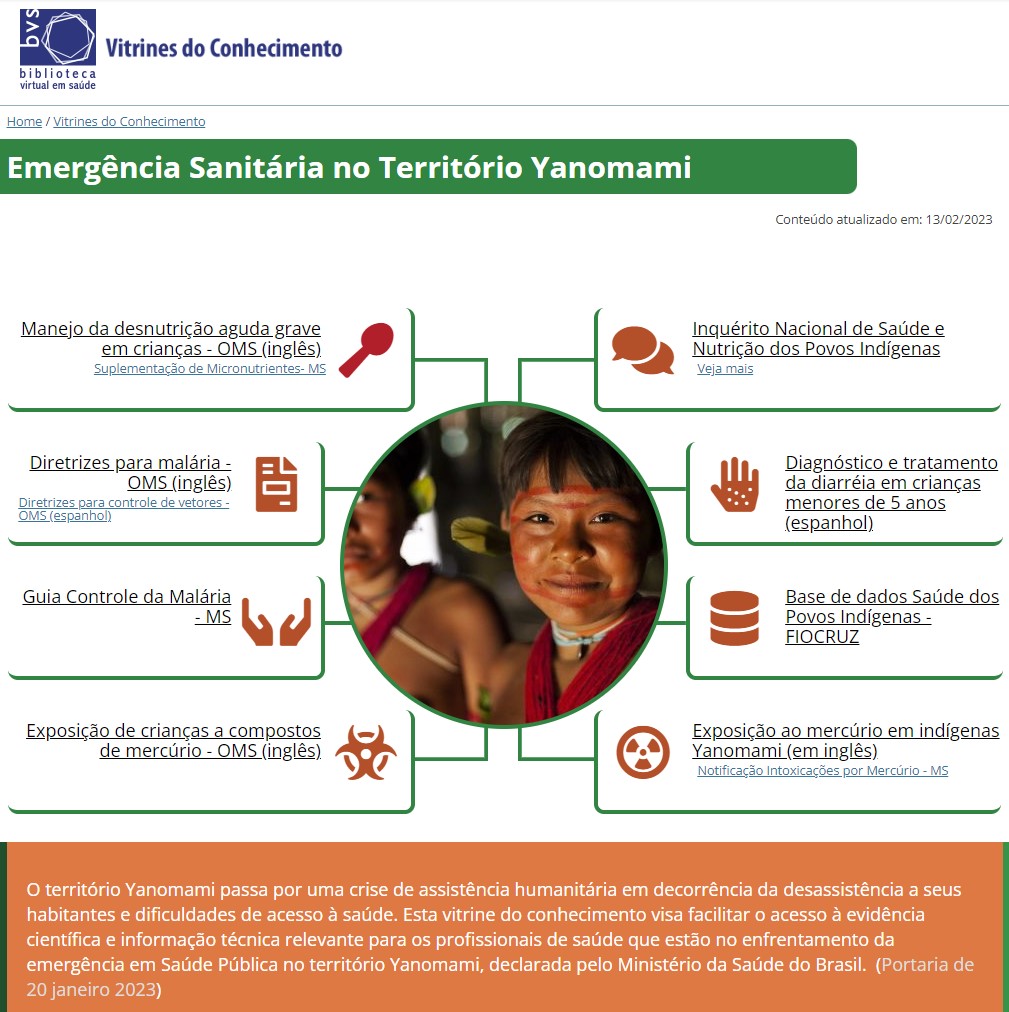
February 23, 2023 (PAHO) — The indigenous peoples of the Yanomami territory are experiencing a humanitarian crisis due to lack of assistance and difficulties in access to health care, which led the Brazilian Ministry of Health (MS, in the Portuguese acronym), through the Ordinance GM/MS No. 28 of January 20, 2023, to declare a Public Health Emergency of National Importance (ESPIN in the Portuguese acronym) in the Yanomami Territory.
The Ordinance establishes the Public Health Emergency Operations Center (COE – Yanomami) as the national mechanism for the coordinated management of the emergency response at the national level. The COE – Yanomami is responsible for planning, organizing, coordinating, and controlling the response strategies and measures to be employed to respond to ESPIN in the Yanomami Territory, including the mobilization of resources for the reestablishment of health services and liaison with state and municipal managers of Brazil’s Unified Health System (SUS).
In solidarity with this emergency, BIREME joins the mobilization actions and develops a Window of Knowledge in the Virtual Health Library (VHL) to facilitate access to scientific evidence and relevant technical information to professionals who work in the confrontation of the Public Health emergency in the Yanomami territory.
The Window of Knowledge Health Emergency in the Yanomami Territory was published in the VHL on January 26 and since then has been updated daily with relevant information to address the main health problems that have been devastating the Yanomami people:
– Food insecurity, severe malnutrition, and acute diarrheal diseases;
– Malaria and tuberculosis; and
– Mercury contamination
These issues are also aligned with the highlighted theme of Public Health Emergency Preparedness. Among the types of documents selected and highlighted in the showcase are practice guides, systematic reviews, reference documents (health surveys), and PAHO/WHO documents on Public Health Emergency Preparedness. The Showcase also makes reference to other relevant resources and websites on the topic:
– Ministry of Health’s Yanomami Mission News Channel
– Emergency Operation Center – COE-Yanomami
– Situation Room for the Yanomami Indigenous Territory
– Health of Indigenous Peoples Collection – FIOCRUZ Press
– Window of Knowledge – Alcoholism in Indigenous Communities
– Window of Knowledge – Sexually Transmitted Infections
Indigenous Health VHL and Indigenous People VHL
In another initiative of solidarity and contribution to face the health emergency in the Yanomami Land, BIREME and FIOCRUZ teams resumed their collaboration to reactivate the Indigenous Peoples VHL, coordinated by the National School of Public Health Sergio Arouca, seeking integration with the Indigenous Health VHL that is being developed in coordination with the Special Secretariat of Indigenous Health (SESAI) of the MS.
In this sense, it is worth highlighting the database on indigenous peoples, which brings together about 6,500 information resources such as books, theses, videos, unconventional documents, news, websites, and others. All the information is categorized by major subjects and indigenous ethnicities.
Main page image credit.
Image from the animated video “Amazonia without mining” https://www.youtube.com/watch?v=8YWyYlsy7NQ&t=1s . (Video included in the information sources of the Window of Knowledge Health Emergency in Yanomami Territory).
Executive Production: Ana Claudia Santiago de Vasconcellos (EPSJV/Fiocruz) and Paulo Cesar Basta (ENSP/Fiocruz).
Funding: INOVA Fiocruz Program and VPAAPS/Fiocruz via the project “Improvement of the Indigenous Health Care Subsystem, through the development of technical studies, scientific research and strategic actions, essential for the diversification, expansion and quality of health services provided to indigenous peoples”.
Organization: Joaquim Venâncio Polytechnic School of Health (EPSJV), in partnership with the National School of Public Health Sergio Arouca (ENSP), of Fiocruz.




